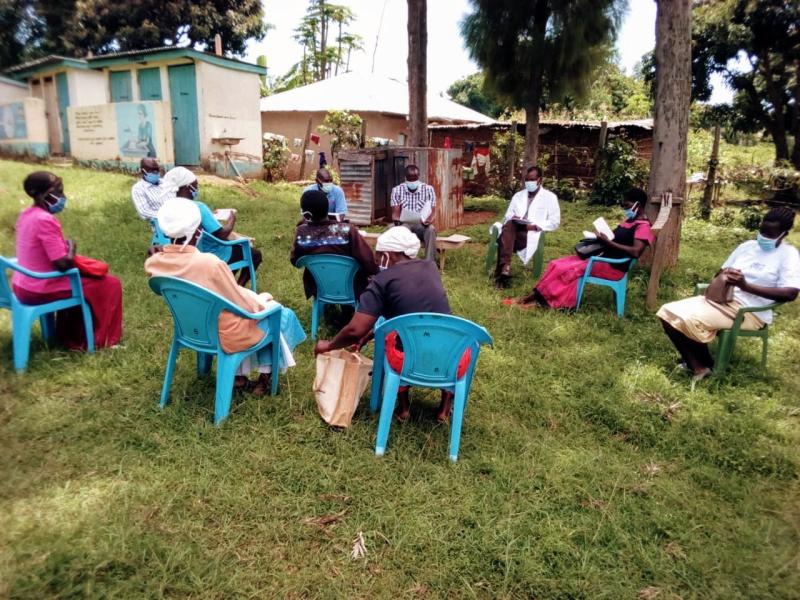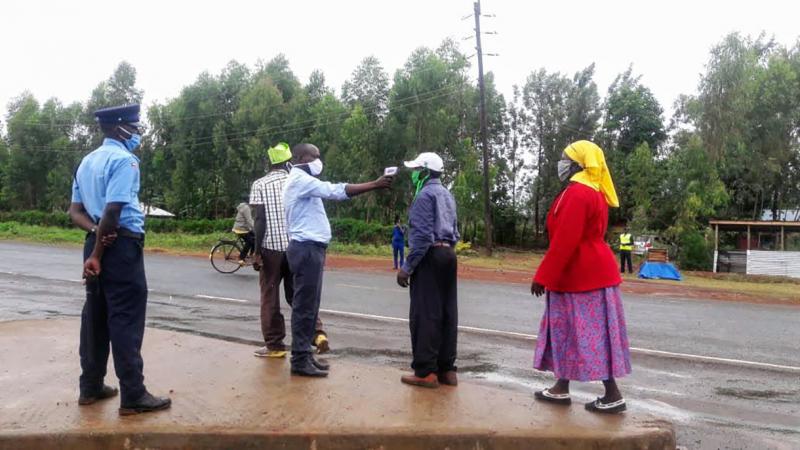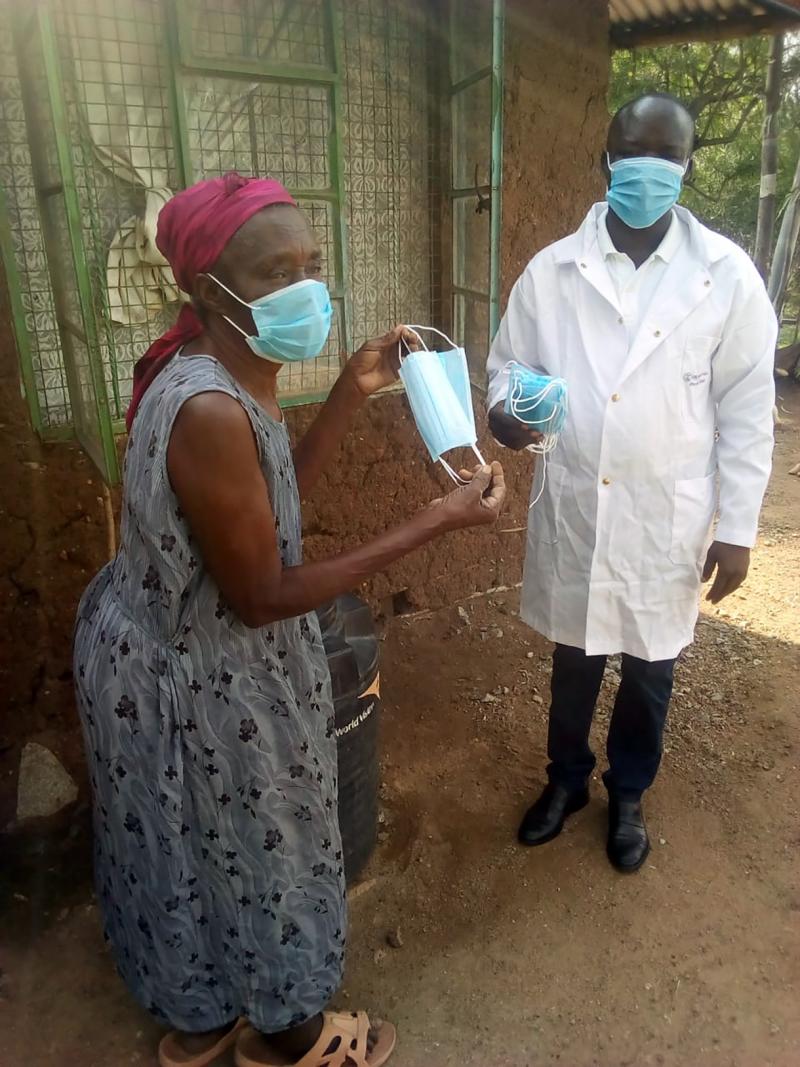Where We Work
See our interactive map


Milton conducts a COVID-19 sensitization meeting in his community. Photo courtesy of Milton Okumu Maina for IntraHealth International.
How health worker Milton Okumu Maina adapted to the fight against a pandemic.
Milton Okumu Maina used to spend his time supervising community health volunteers and coordinating community health activities in Kenya. He’s a community health assistant (CHA), also known as community health extension worker (CHEW), for the Nduru Kadero and West Katieno Community Health Units in Kisumu County, Kenya.
But in the spring of 2020, his job completely changed.
Milton is one of the many health workers across Kenya who are at the forefront of the response to the COVID-19 virus. But even his nine years of experience didn’t prepare him for a global pandemic.
When coronavirus cases began to rise and spread around the world including in Kenya, Milton was selected to join the Kisumu County COVID-19 surveillance team. Blending his knowledge and skills as a community health assistant, Milton began to train community health volunteers on COVID-19 prevention, transmission, and management and help them disseminate that information to local households.
He also began screening people at the county borders, contact tracing, and ensuring the public follows safety guidelines, such as social distancing and wearing face masks.

Milton conducting temperature checks at the border.
While conducting this important work, Milton witnessed the adverse effects of COVID-19 on health services at the community level. He noticed that community health staff were not prepared to handle home-based care of asymptomatic or mildly symptomatic patients. He also noticed that many homes lacked running water for washing hands, that stigma against COVID-19 survivors was keeping them from serving as change agents, and low morale permeated among the volunteers due to late payments and lack of a medical insurance coverage.
In response to these challenges, IntraHealth International’s Human Resources for Health (HRH) Kenya Program collaborated with the Kenyan Ministry of Health Division of Community Health to develop a COVID-19 eLearning course for community health assistants. The course, which Milton and 1,030 others have already completed, builds COVID-19 knowledge and skills on preventing transmission, communicating risk, reducing social stigma, occupational safety and health, contact tracing, and home-based care for COVID-19 patients.
Now fully trained, Milton says the biggest challenges are the many myths and misconceptions surrounding the virus.
“While dealing with COVID-19, I soon realized that it’s a disease marred with a lot of fear and stigmatization,” he says. “When I was screening people at the border and doing contact tracing, I knew I had to proceed with caution, especially when handling people during this difficult time.”
The disease has not only elicited fear, but it has also fueled rumors, distrust, and panic.
"It's quite disheartening when you are confronted by some of the myths going around concerning this disease,” Milton says. “Some hold the opinion that it's a disease of the rich and the elderly, while others believe it is a curse from God. We also have others who think that the virus can be cured by taking a concoction of ginger and lemon."
In a bid to dispel these beliefs, Milton and his team are reaching out to the communities by using COVID-19-related data drawn from the international, national, and county statistics. They are also educating people on the virus, providing them with as much accurate information as possible, and incorporating a behavioral change communication model, which has proved useful in discouraging handshakes and other types of close contact.
"Most people are heeding our call and are acting accordingly,” Milton says. “Establishments have set up handwashing areas—including shops, markets, and bus stations—which is quite encouraging. The surveillance team is highly efficient and proactive, especially in contact tracing, referrals, and reporting systems and the county has been providing enough security and other supplies to carry out our roles.”

Milton distributing facemasks.
Milton is among the 77community health extension workers sponsored by the HRH Kenya Program. In 2019, he completed a five-month blended in-service training course in partnership with the Kenya Medical Training College. The training taught him and other community health extension workers how to strengthen community-level health services by building community health workers’ skills in HIV; reproductive, maternal, newborn, child, and adolescent health; family planning; and other priority health services.
The training also focused on equipping them with additional skills in management, supervision, counseling, and effective communication, which helped Milton respond to COVID-19.
Now Milton uses his counseling skills to guide, reassure, and address his clients’ concerns accordingly. His communication skills have enabled him to disseminate COVID-19-related information in a clear, concise, and effective manner.
He is also mentoring 25 community health volunteers, training and equipping them with the valuable knowledge and skills he acquired during his 2019 training. As a result, the two health units where he works have continued to achieve remarkable results.
The Human Resources for Health (HRH) Kenya Program is a five-year project funded by the US Agency for International Development (USAID) to strengthen health professional training programs and health workforce management systems throughout Kenya to help the country improve the health of its citizens.The project is currently supporting another cohort of CHEWs including an additional 3 CHEWs from Kisumu County will participate this year’s training.
The COVID-19 course for Community Health Assistants is currently being provided for all CHAs in the country and can be accessed at http://elearning.hrhkenya.or.ke/ or https://elearning.health.go.ke/
Get the latest updates from the blog and eNews




